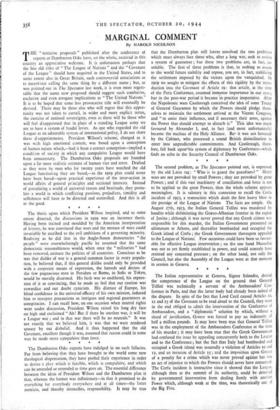The thesis upon which President Wilson inspired, and to some
extent directed, the discussions in 1919 was an incorrect thesis. Having been trained and moulded by the American interpretation of history, he was convinced that wars and the menace of wars could invariably be ascribed to the evil ambitions of a governing minority. Realising as he did that in the Anglo-Saxon democracies " the people " were overwhelmingly pacific he assumed that the same democratic reasonableness would, when once the " militarists " had been removed, animate the policies of all countries: Conscious as he was that dislike of war is a general common factor in every popula- tion, he believed that, if this general dislike could only be provided with a corporate means of expression, the hatreds and desires of the few pugnacious men in Potsdam or Rome, in Sofia or Tokyo, would be morally disarmed. His faith was so undiluted, his expres- sion of it so convincing, that he made us feel that our caution was cowardice and our doubt cynicism. His distrust of Europe, his blind confidence in the universal efficacy of his own mission, induced him to interpret precautions as intrigues and regional guarantees as conspiracies. I can recall how, on one occasion when neutral rights were under discussion, President Wilson raised his long dry face on high and exclaimed " Ah! But if there be another. war, it will be a League war ; and in that war there will be no neutrals." It was not exactly that we believed him, it was that we were rendered uneasy by our disbelief. And it thus happened that the old Covenant, excellent though it was, assumed that reason could in some way be made more compulsive than force.


























 Previous page
Previous page